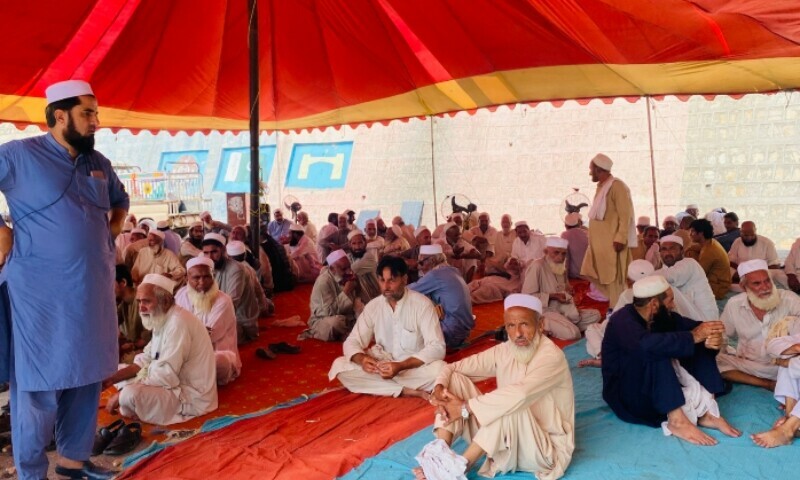Residents of the valley, situated in KP, have staged a demonstration at the Pakistan-Afghanistan Torkham border demanding their right to return home.
Haji Kareem, 45, hasn’t been home in over a decade. For the past 12 years, he has moved from one relative’s place to another, sometimes even seeking shelter inside caves and partially damaged mud houses.
“We have been living as internally displaced persons since 2011,” says the father of six, who hails from Tirah Valley in Khyber Pakhtunkhwa’s Khyber district. “It is our right to return home and live on our lands, but we are not permitted to do so.”
According to a report by Hague-based NGO Global Human Rights Defence, approximately 1.4 million people from erstwhile Fata — the acronym by which the Federally Administered Tribal Areas have been known since Pakistan’s inception — remain displaced due to extremism and militancy.
Kareem’s hometown was among the areas that bore the brunt of terrorism and the consequent military operations. Thousands of families in the Tirah Valley vacated their homes in 2013 and lived a miserable 10 years in displacement, only returning when they were given firm assurance by law enforcement agencies about the restoration of lasting peace and expulsion of all militants and miscreants.
In recent years, however, they have once again found themselves in the middle of conflict amid the resurgence of outlawed militant groups. In November last year, security forces in the region ordered hundreds of families in different parts of the valley to vacate their houses in anticipation of a possible operation against suspected militants.
Last month, reports of armed men from militant groups Tehreek-i-Taliban Pakistan (TTP) and Lashkar-i-Islam (LI) patrolling the Tirah Valley also emerged. Last week, a young girl lost her life after an intense exchange of fire between security forces and militants in areas bordering the Orakzai district.
Civil society members in Khyber have of late expressed concerns over the deteriorating security situation in the region and raised questions over the large number of armed militants in the valley, alleging that an atmosphere of fear and insecurity was intentionally being created with ‘artificial’ Taliban.
One demand
Kareem, belonging to the Kukikhel tribe, has spent the last 30 days in protest on the Pakistan-Afghanistan Torkham Highway in the Bhagyari area of Jamrud tehsil. Other participants of the protest included tribesmen from Rajgal and Sarawala villages.
Kareem and his fellow protesters have one demand: they want to return home.
The demonstration, organised by the Dharna Committee, has brought together hundreds of displaced Tirah Valley residents, who are disappointed with the authorities’ refusal to allow them to return home. The committee, which represents the Kukikhel tribe, claims that more than 6,000 families want to return to their ancestral lands.
While 60-70 per cent of the displaced persons from the Kukikhel tribe have returned to their land, the remaining are protesting for their right to go home. But despite several meetings with the government, a solution to their displacement remains elusive.
The protesters, however, say that they haven’t been allowed to return to their homes despite these measures and vow to escalate their roadblock to protest against the state’s lack of response.
On the other hand, a government official from the Khyber district, speaking on condition of anonymity, told Dawn.com that residents of Rajgal were being denied the right to return owing to security concerns due to the area’s proximity to the border. Permitting the IDPs to return would pose considerable security problems, he added.
But Malik Said Ghajan, a political leader belonging to the Kukikhel tribe and member of the Dharna Committee, disagrees. “If there are security issues, then what is the purpose of the border security measures that have cost billions of rupees?” he questioned.
“The state claims to have everything under control, but terrorism persists. Where are the terrorists coming from? How are they moving freely, and who is supporting them?”
Dawn.com reached out to Sana Ullah, the district police officer of Khyber district, for comment but he did not respond.
The flip side
The Torkham Highway, where the protesters have been stationed for over a month now, connects Peshawar to one of Pakistan’s most strategic border crossings and trade routes, making the demonstration all the more significant.
In the backdrop of dry and rugged peaks, the homeless tribesmen of Tirah sit under a tent in the middle of the road. The protest, spearheaded by youngsters, continues through the night. Nearby, heavy vehicles stand parked.
One of these vehicles belongs to Abdur Razziq, a 19-year-old truck driver from Peshawar, who has been stuck in Landi Kotal — the administrative capital of Khyber district — for a month and is increasingly getting frustrated.
“There is always something going on, and the road is obstructed every other day,” he said. “We are the ones who are constantly suffering, but no one cares about us. In this one month, we spent over Rs15,000, which could have been utilised at home.”
Razziq rued that in addition to the cost of food, his vehicle had suffered damage in these past few days due to prolonged exposure to sunlight. Being the only breadwinner of his family, alongside his father, the 19-year-old lamented how such protests had taken a significant toll on his finances.
“I don’t know when we’ll be able to peacefully do our job without encountering such hurdles every then and now,” he added.
Razziq is not alone. According to Customs Agent Association President Aimal Shinwari, the highway blockades caused by protests have resulted in a daily loss of between Rs100 to Rs200 million for traders on either side of the border.
Highlighting the gravity of the situation, he said: “This has had a significant impact on Pakistani traders. The government should negotiate with the demonstrators to settle the issues, as this has created numerous challenges for imports and exports.”
Shinwari went on to say that the blockade had an impact not only on the local economy but also on international trade, with vehicles from other nations en route to Afghanistan stuck in the blockade.
‘No other choice’
While the protesters agree that their demonstration is negatively affecting locals and traders, they say they have no other choice.
“We know that our protest is causing trouble for the locals, but we have no other way to demand our rights,” Ghajan told Dawn.com. “For now, what we have done is that we give way to emergency cases, patients and school children.”
He added that the demonstrations were peaceful. “We have not caused any damage or injuries; all we want is to return to our land. We are united in our demand, and our leaders from each tehsil are here, protesting on behalf of the people,” Ganjan said.
The protesters backed his statement, saying that would continue to protest until their demands were met. They’ve also warned that if they don’t get a positive response, other locations would be blocked as well.
“It’s not easy for us as well,” said Haji Kareem. “We leave our homes early in the morning and have not seen our children in weeks. Our family members are always worried about us; we could get injured or even killed.”
But regardless of all the dangers, the protesters believe they have no choice but to continue their protest. “We have to keep protesting for our rights; we’re not just fighting for ourselves, but for our children, our families, and our future.”
Header image: Protesters sit under a tent set up at the Torkham Highway. — All photos provided by author







